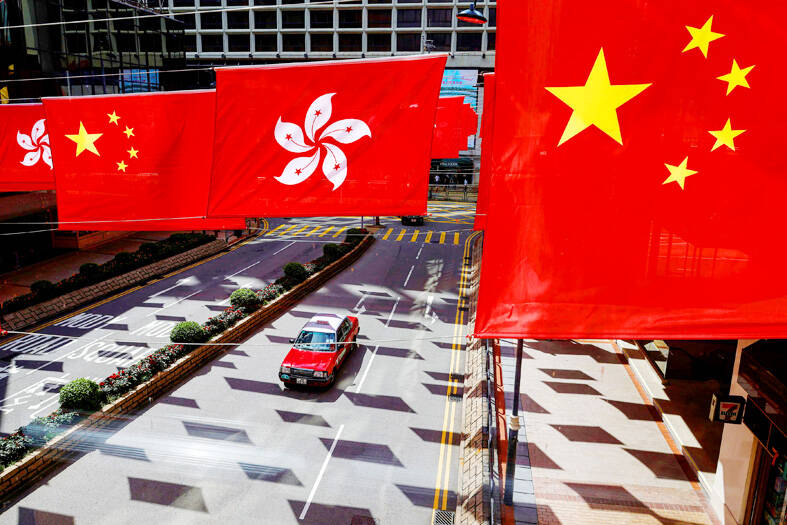China’s appointment of a top intelligence official to run Hong Kong’s national security regime underscores its determination to tighten its grip on territory, diplomats and analysts said.
Dong Jingwei (董經緯), 59, is the highest-level Chinese security official to be appointed to a senior role in Hong Kong since Beijing imposed the National Security Law on the territory in 2020.
He has been appointed director of the Office for Safeguarding National Security of the Central People’s Government in the Hong Kong Special Administrative Region, Beijing said in a statement on Tuesday.

Photo: Reuters
Dong would be expected to bolster security oversight of Hong Kong, rocked for months in 2019 by pro-democracy protests that posed a crisis for the Chinese Communist Party leadership.
Under the security law, China’s national security office has sweeping investigative and surveillance powers, and enjoys immunity from Hong Kong laws.
The office is also charged with oversight of “foreign countries and international organizations.”
Dong was Chinese vice minister of state security, a role that included catching foreign spies in China, state media reports said.
Dong told a ministry symposium in 2021 of the need for a “people’s war” against espionage, working to “not only catch spies but ... to catch internal traitors” who colluded with foreign spy agencies, a Chinese government statement said.
The Chinese Ministry of State Security is playing a major role in a clampdown on some foreign due diligence firms in China that has added to tensions with the US, diplomats say.
The ministry could not be reached for comment.
Dong’s appointment comes as Hong Kong prepares to bolster its national security regimen with a new law, called Article 23, that Hong Kong officials say would encompass espionage and treason among other offenses not covered in the 2020 legislation.
In an essay published in July last year in a journal dedicated to Chinese President Xi Jinping’s (習近平) thinking on the rule of law, Dong said that “Western forces” had been instigating a “color revolution” in Hong Kong, and the security law had been vital to restore order.
“The appointment of such a powerful intelligence figure as Dong to take charge in Hong Kong is a bit of surprise,” one Asian envoy said. “The government is trying to show it is open for international business, but this will send a shiver and raises fresh questions about the future operating environment.”
Additional reporting by Bloomberg

The Taiwanese passport ranked 33rd in a global listing of passports by convenience this month, rising three places from last month’s ranking, but matching its position in January last year. The Henley Passport Index, an international ranking of passports by the number of designations its holder can travel to without a visa, showed that the Taiwan passport enables holders to travel to 139 countries and territories without a visa. Singapore’s passport was ranked the most powerful with visa-free access to 192 destinations out of 227, according to the index published on Tuesday by UK-based migration investment consultancy firm Henley and Partners. Japan’s and

NATIONAL SECURITY THREAT: An official said that Guan Guan’s comments had gone beyond the threshold of free speech, as she advocated for the destruction of the ROC China-born media influencer Guan Guan’s (關關) residency permit has been revoked for repeatedly posting pro-China content that threatens national security, the National Immigration Agency said yesterday. Guan Guan has said many controversial things in her videos posted to Douyin (抖音), including “the red flag will soon be painted all over Taiwan” and “Taiwan is an inseparable part of China,” while expressing hope for expedited “reunification.” The agency received multiple reports alleging that Guan Guan had advocated for armed reunification last year. After investigating, the agency last month issued a notice requiring her to appear and account for her actions. Guan Guan appeared as required,

Japan and the Philippines yesterday signed a defense pact that would allow the tax-free provision of ammunition, fuel, food and other necessities when their forces stage joint training to boost deterrence against China’s growing aggression in the region and to bolster their preparation for natural disasters. Japan has faced increasing political, trade and security tensions with China, which was angered by Japanese Prime Minister Sanae Takaichi’s remark that a Chinese attack on Taiwan would be a survival-threatening situation for Japan, triggering a military response. Japan and the Philippines have also had separate territorial conflicts with Beijing in the East and South China

A strong cold air mass is expected to arrive tonight, bringing a change in weather and a drop in temperature, the Central Weather Administration (CWA) said. The coldest time would be early on Thursday morning, with temperatures in some areas dipping as low as 8°C, it said. Daytime highs yesterday were 22°C to 24°C in northern and eastern Taiwan, and about 25°C to 28°C in the central and southern regions, it said. However, nighttime lows would dip to about 15°C to 16°C in central and northern Taiwan as well as the northeast, and 17°C to 19°C elsewhere, it said. Tropical Storm Nokaen, currently